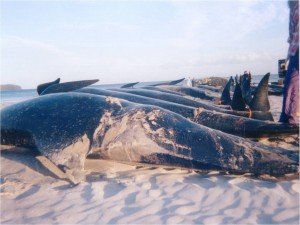
ONLINE MEDIA BRIEFING (Wed 20 Oct):
Last month’s mass stranding event of over 70 pilot whales on a remote Northland beach highlighted New Zealand’s position as one of the most frequent sites of marine mammal strandings in the world.
Theories abound as to why whales become beached — ranging from disorientation to illness to unwillingness to abandon distressed animals — as well as more controversial notions about disrupted food supplies from overfishing and human-induced noise in the ocean.
What can be learned from these dramatic mass strandings? Are they becoming more frequent? How much evidence is there to back up popular theories about why they happen?
In this Science Media Centre briefing, we bring together a panel of experts on whale behaviour and marine mammal strandings to discuss these questions and update journalists on recent scientific research.
LISTEN TO AUDIO:
Click on the player below to hear an audio recording of the online briefing. Registered journalists can also download copies of the speakers’ slides in the Resource Library.
(NB: Due to a technical issue, recording of the Q&A session following the speakers’ presentations was cut off before the conclusion had been reached. We apologise for any inconvenience caused)
SPEAKERS:
Anton van Helden – Te Papa
Anton is Te Papa’s marine mammals collections manager. He maintains the national Whale Stranding Database, which chronicles stranding events from historical records through to the present day, and is frequently called upon to identify stranded marine mammals for the Department of Conservation.
Dr Rochelle Constantine – University of Auckland
Rochelle is a Senior Tutor in the School of Biological Sciences, University of Auckland. She conducts research on the conservation and behavioural ecology of several whale and dolphin species in New Zealand and the South Pacific. She is also the curator of the National Cetacean Tissue Archive, the second largest in the world, and has around 20 years experience with cetacean research including numerous stranding events and necropsies.
Dr Karen Stockin – Massey University
Karen is a Lecturer in Marine Ecology in the Coastal-Marine Research Group, Institute of Natural Sciences, Massey University. Her research focus is marine mammals and their interactions with the ecosystem. Specific interests include the examination of anthropogenic impacts including tourism, pollution and fisheries. She was actively involved in last month’s mass pilot whale stranding in Northland, heading a team of scientists in the field.